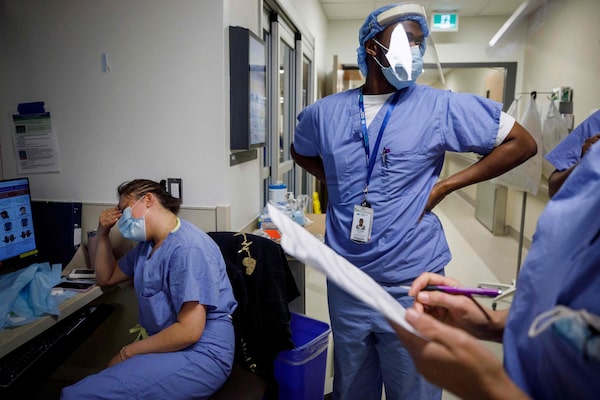
Nurses care for patients suffering from COVID-19 at Humber River Hospital's Intensive Care Unit, in Toronto on April 28, 2021.COLE BURSTON/AFP/Getty Images
Two health care unions in Ontario released a poll that suggests more than 60 per cent of registered practical nurses in the province are considering leaving the profession over pay.
SEIU Healthcare and the Canadian Union of Public Employees said the poll, conducted by Nanos Research, shows the provincial government isn’t doing enough to recruit and retain nurses amid staffing shortages within the health care system. The unions are using the survey results, which were released Tuesday, to press the province to increase wages.
Nanos surveyed 1,029 nurses last month. Forty-one per cent of respondents agreed with the statements that their pay doesn’t match the high workload caused by short staffing, and that they do the same work as registered nurses for much lower pay. About a quarter reported having a second job.
Sixty-two per cent said they were considering or somewhat considering leaving the profession over the next five years.
“So, this begs the question: Why is the Doug Ford PC government not acting to stabilize staffing?” said Dave Verch, a registered practical nurse who is also a vice-president of CUPE. “Ontario can and must do better to retain RPNs.”
The telephone survey was conducted from March 12 to 18. It does not have a margin of error.
Hospital-based registered practical nurses are set for arbitration next month as they seek a wage adjustment in the wake of a court ruling last year that struck down a cap on public-sector raises.
An Ontario Superior Court judge overturned the law, previously known as Bill 124, which capped wage increases for hundreds of thousands of public-sector workers to 1 per cent a year. Unions have argued that the wage cap combined with high inflation have effectively amounted to significant pay cut.
SEIU said the average wage of registered practical nurses in Ontario is about $31 an hour. In the poll, more than three-quarters of respondents indicated they would consider staying in the profession with a wage increase to $35 an hour.
Registered practical nurses typically have a college diploma that takes about two years to complete, while registered nurses complete a four-year degree program, often through a university.
Ministry of Health spokesperson Hannah Jensen issued a statement that pointed to provincial efforts to recruit nurses.
The statement said that since the government took office in 2018, more than 60,000 new nurses have registered to work in Ontario, including more than 12,000 last year, which was a record. The government has also added funding for training and made it easier for internationally trained health care workers to practise in Ontario, she said.
The unions pointed to other provinces to argue that Ontario is falling behind.
For example, Mr. Verch noted that the B.C. government brought in more than 70 changes from safer nurse-to-patient staffing, to pay increases, to a special $100-million fund to support nurses well-being. The unions’ poll also looked at the well-being of registered practical nurses in Ontario, with four out of five respondents saying they experience high stress because of their job. Sixty-four per cent say they are having trouble sleeping, 63 per cent say they dread going to work and about 40 per cent reported feeling depressed.
“The spirit of nursing is in a dark place,” said Jackie Walker, a registered practical nurse and nursing division president for SEIU Healthcare. “Parents would be calling their teachers and principals in a panic if children were bringing home these types of report cards. Stress is endemic. Trouble sleeping is pervasive. Dread is everywhere.”
While Ms. Walker acknowledged that the province is recruiting more nurses, she said experienced nurses are needed to mentor and train these new nurses.
“Those nurses are not staying,” she said. “We need to do more to keep nurses at the bedside and not focus on these fancy numbers that don’t truly reflect what’s happening.”